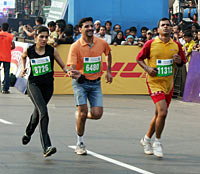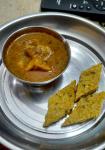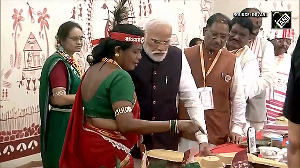 The Mumbai marathon is scheduled for January 17. Thousands of participants will descend on the city to run for competition, their pet cause, or just to prove they have what it takes to complete the gruelling course. So to help those preparing to take up the challenge, rediff.com presents a series of features that will help you boost your strength -- both physical and mental -- and cross that finish line. In the first part of our series we look at some of the most common mistakes beginners make in their preparation.
The Mumbai marathon is scheduled for January 17. Thousands of participants will descend on the city to run for competition, their pet cause, or just to prove they have what it takes to complete the gruelling course. So to help those preparing to take up the challenge, rediff.com presents a series of features that will help you boost your strength -- both physical and mental -- and cross that finish line. In the first part of our series we look at some of the most common mistakes beginners make in their preparation.
If you've decided that running a marathon is something you would like to do and you have already committed some time to training, improving your fitness levels and your endurance so that you have the physical ability to actually run a marathon, then learning exactly how to not run a marathon will be the last part of the puzzle to put in to place.
You should by now have built up your weekly mileage to a point where longer distances aren't a challenge any more and if you've managed to avoid getting injured or picking up any niggling aches along the way, then the only remaining obstacle in achieving your goal is to go and run a marathon.
As simple as that sounds, you need to avoid these mistakes first-time marathon runners often make:
Wrong goal
Many first-time runners naturally think they should set a marathon finish time goal. This is not the case. Your goal for your first marathon or half marathon should simply be to finish. If you push yourself too much, you are dramatically increasing the likelihood of injury and not even seeing the starting line. Set a time goal for your next marathon or half marathon. This may sound strange, but it is quite wise. Be smart and set the right goals.
Hydration
You can go for a long, long time without food before you starve. But not water. You must stay hydrated to avoid dehydration, heat illness and to keep a strong pace. Preferably, you should be hydrating with a sports drink containing carbohydrates and electrolytes instead of plain water. Drinking only water during a marathon can actually be dangerous because it can cause a condition called hyponatremia (which implies that the body's sodium leves are abnormally low). Also, if you are going to drink sports drinks, don't bother drinking water too as the water will dilute the concentration of the sports drink and slow down the absorption of the carbohydrates. Drink 230 to 300 ml (around 8 to 10 ounces) of sports drink about 10 minutes before the run begins and then 150 to 175 ml (around 5 to 6 ounces) every two miles (around three km) or so during the race.
Eating a wrong pre-race meal
It seems that some people eat things that might not agree with their stomachs on race day. Well, for your pre-marathon breakfast, you should choose only comfort foods -- eat foods that your system can digest easily and add to the carbohydrate stockpiles in your liver, blood and muscles. They should furnish enough sustenance to fuel your prolonged effort. Examples include pasta, banana, dried apricots, yogurt, milk, kidney beans, apple and pear. Also, before a marathon race it is preferable not to eat for at least two hours before the race so that the food you consume is digested.
Underestimating the importance of stretching
Many beginning runners finish a run and neglect to stretch enough or even at all. They then find themselves tight and sore and eventually with a running injury. Do not neglect the importance of stretching! Stretch within 15 minutes after every run and take your time. As you progress through training, add a few seconds to each stretch and build up to 20 seconds or more per stretch. Benefits will include less soreness, greater flexibility, longer stride, and much more. Do not underestimate the importance of stretching.
Trying something new on race weekend
Don't do anything different on marathon day than you've done on other training days. This means not eating new foods, taking new supplements, running with a new running outfit or running with a new pair of shoes.
Forgetting blister and chafing preparation
Almost everyone gets foot blisters in a marathon. Prevent them as long as possible by preparing your feet with lubricants, corn starch and sweat-wicking socks. You should have been testing what works for you on your longest running/ walking days. Don't forget to put lubricant on your armpits, thighs, crotch, nipples, and under-bra areas. Chafing is sheer torture in the final miles. Some marathons will often provide petroleum jelly at checkpoints, which can be used to lubricate any areas that are starting to chafe.
Running before race day
If you're the type of person who gets race anxiety, it might be beneficial for you to do a very slow, 20-minute jog the day before. But if you think you perform better on rest, then just relax during those 24 hours leading up to the race. Whatever you do, just make sure that you don't do a significant workout that's going to leave you feeling tired or sore the next day.
Running fast in the beginning
It's easy to get caught up in race-day excitement and charge over like the marathon is a 5K run. But it's not, and you'll pay for it later in the race. Take the first few miles as a warm-up and gradually work to a comfortable pack. Start slow and finish strong.
Competitive running
Trying to keep up with someone else in the race, especially someone you've never met before, but have taken a dislike to being overtaken by is a big mistake. You have no idea what level of fitness other runners have and not everyone who is fit actually looks fit. Any bursts of speed or extra effort above what you have conditioned your body to do during training will always take its toll on you at some stage in the race.
Walking during the race
Walking is slower than running. If you think you're going to run fast and then walk a little and then run fast, you won't end up with your best time. If you can't run the whole race at the pace you're going, slow down to a pace where you know you'll be able to run the whole time. This will give you a much better time.
Increasing mileage all the way up until race day
You actually want to reduce the volume of your training for a short time leading up to the race. Known as tapering, this will reduce your risk for injury and help you perform your absolute best when it matters most. It takes about four weeks to recover from a long run of 18 to 20 miles (29 to 32 km) or so. This means, obviously, that no runs of 18 miles or longer should be conducted during the month leading up to a marathon. Four-week tapers work well for the marathon, and weekly mileage during these four weeks can be 80 per cent, 60 per cent, 40 per cent, and then 25 per cent of usual levels.
If you want to learn how to run a marathon and how much training you need to do in order to accomplish this goal, then you need to fully understand what running a marathon is all about. Do some reading and some research in to how your body adapts to endurance training. Without this knowledge you run the very real risk of serious long term injury, let alone ever being able to run a marathon.
Photograph: Reuben NV






